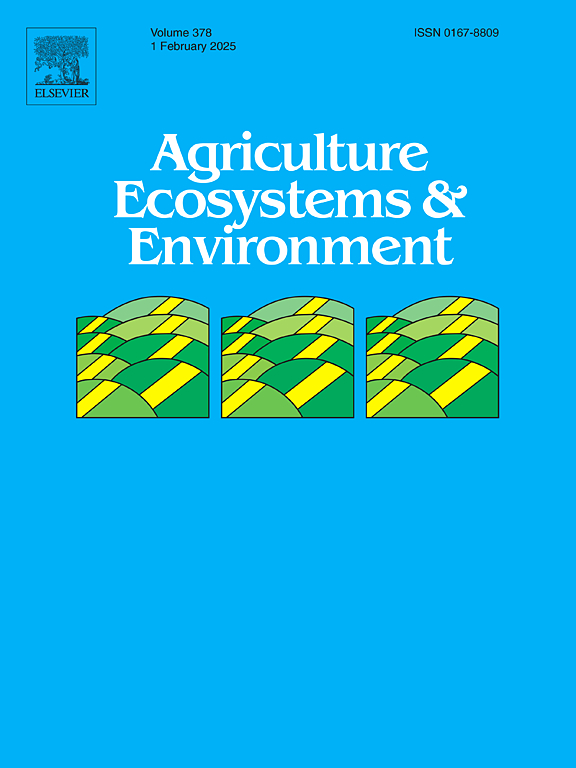模拟暖冬降低了杀虫剂对油菜的药效,但对传粉昆虫的活性影响不大
IF 6.4
1区 农林科学
Q1 AGRICULTURE, MULTIDISCIPLINARY
引用次数: 0
摘要
气候变化可能通过改变害虫压力和传粉媒介提供的服务之间的相互作用来影响大规模开花作物的产量,但现实的预测需要考虑到传统农业中频繁使用杀虫剂的情况。我们测试了杀虫剂使用和暖冬条件对油菜(Brassica napus)产量、害虫压力和大黄蜂(Bombus terrestris)(一种重要的传粉媒介)活动的交互作用。我们评估了三种不同杀虫剂在两种不同浓度下的效果。我们发现,与对照组(无杀虫剂)相比,冬季变暖降低了两种杀虫剂对花粉甲虫的有效性,这可能是由于随着植物大小的增加,杀虫剂对植物的稀释。此外,使用杀虫剂浓度降低的地块与使用标准浓度的地块花粉甲虫的水平大致相同。施用杀虫剂和冬暖对传粉昆虫活动和油菜产量没有交互作用。但冬暖对产量品质有负面影响。在目前的冬季条件下,减少杀虫剂的施用可能提供与标准施用相当的虫害防治,因此可以作为一种综合虫害管理战略。在未来的冬季条件下,这种策略可能需要考虑气候变化对植物发育的影响,因为杀虫剂治疗害虫的总体有效性可能会下降。本文章由计算机程序翻译,如有差异,请以英文原文为准。
Simulated warmer winter reduces the effectiveness of insecticides in oilseed rape, but has little effect on pollinator activity
Climate change may affect the yield of mass-flowering crops by altering the interplay between pest pressure and service delivery by pollinators, but realistic predictions need to account for the frequent use of insecticides in conventional farming. We tested the interactive effects of insecticide use and warmer winter conditions on oilseed rape (Brassica napus) production, pest pressure, and the activity of Bombus terrestris, an important bumblebee pollinator. We evaluated the effects of three different insecticides at two different concentrations. We found that winter warming reduced the effectiveness of two insecticides against pollen beetles in comparison to the control (no insecticides), likely due to the dilution of insecticides on plants with increased plant size. Additionally, plots treated with reduced concentrations of insecticides generally had similar levels of pollen beetles as those with standard concentrations. There were no interactive effects of insecticide application and winter warming on pollinator activity or oilseed rape yield. However, yield quality was negatively affected by winter warming. Under current winter conditions, reduced insecticide applications may provide pest control comparable to standard applications and could therefore serve as an integrated pest management strategy. Under future winter conditions, such strategies will likely need to consider the effects of climate change on plant development, because the overall effectiveness of insecticide treatment against pests could decrease.
求助全文
通过发布文献求助,成功后即可免费获取论文全文。
去求助
来源期刊

Agriculture, Ecosystems & Environment
环境科学-环境科学
CiteScore
11.70
自引率
9.10%
发文量
392
审稿时长
26 days
期刊介绍:
Agriculture, Ecosystems and Environment publishes scientific articles dealing with the interface between agroecosystems and the natural environment, specifically how agriculture influences the environment and how changes in that environment impact agroecosystems. Preference is given to papers from experimental and observational research at the field, system or landscape level, from studies that enhance our understanding of processes using data-based biophysical modelling, and papers that bridge scientific disciplines and integrate knowledge. All papers should be placed in an international or wide comparative context.
 求助内容:
求助内容: 应助结果提醒方式:
应助结果提醒方式:


